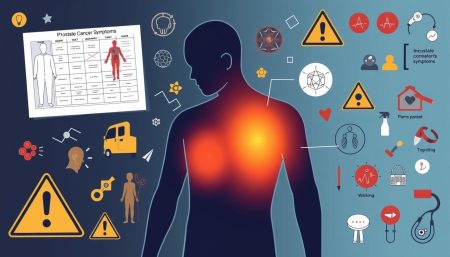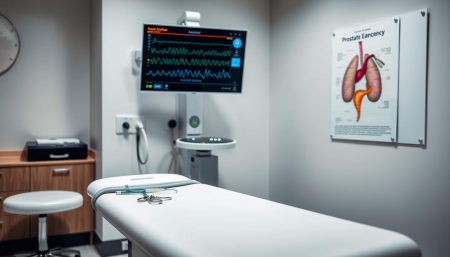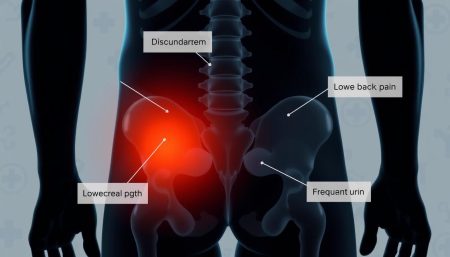Preventing prostate cancer begins with knowing your risk and acting on it. This guide will show you how to lower your risk and keep your prostate healthy. By making smart choices, you can protect yourself from this common cancer.
We’ll look at diet changes and exercise habits to help you avoid prostate cancer. Our aim is to give you useful tips for preventing prostate cancer. Let’s explore what affects prostate health and what you can do now.
Understanding Prostate Cancer Risk Factors
Prostate cancer is a common issue for men around the world. Knowing the risk factors can help protect your health. Let’s look at important prostate cancer risk factors that might affect you or your family.
Age and Family History Considerations
As men get older, their risk of prostate cancer goes up. Most cases happen in men over 50. Family history is also key. If your dad or brother had it, your risk is higher. Learning about these factors helps with screening choices.
Genetic Predisposition and Race
Genetic factors play a big role in prostate cancer risk. Certain genes, like BRCA1 and BRCA2, can raise your risk. Race is also important. African American men face higher rates and more aggressive forms at younger ages.
Environmental Risk Factors
Your environment and lifestyle choices can impact your risk. Eating a lot of red meat or dairy might increase it. Being overweight is another risk. Chemical exposures and smoking can also play a part.
“Knowledge is power. Understanding prostate cancer risk factors empowers men to make informed health choices.”
By knowing these risk factors, you can take steps to prevent and detect prostate cancer early. Regular check-ups and a healthy lifestyle are crucial for your prostate health.
How Can You Avoid Prostate Cancer Through Diet
Eating the right foods is key to avoiding prostate cancer. A diet rich in certain nutrients can greatly improve your prostate health. Let’s look at some dietary tips that may help prevent this common cancer.

The Mediterranean diet is known to lower prostate cancer risk. It focuses on:
- Fresh fruits and vegetables
- Whole grains
- Lean proteins like fish
- Healthy fats from olive oil and nuts
Plant-based diets are also effective in reducing prostate cancer risk. They are packed with phytochemicals and antioxidants. These compounds fight inflammation and oxidative stress.
Some foods that can help reduce prostate cancer risk include:
| Food | Benefit |
|---|---|
| Tomatoes | High in lycopene, an antioxidant linked to lower prostate cancer risk |
| Cruciferous vegetables | Contain compounds that may slow tumor growth |
| Green tea | Rich in polyphenols that may inhibit cancer cell growth |
| Fatty fish | Provides omega-3 fatty acids with anti-inflammatory properties |
No single food can cure everything. A varied, balanced diet and a healthy lifestyle are the best defenses against prostate cancer.
“Let food be thy medicine and medicine be thy food.” – Hippocrates
By eating more plant-based foods and lean proteins, you can help keep your prostate healthy. This may also lower your cancer risk.
Essential Nutrients and Supplements for Prostate Health
Good nutrition is key for a healthy prostate and may lower cancer risk. Let’s look at important nutrients and supplements for prostate health. They can help keep you well.
Vitamin D and Selenium Benefits
Vitamin D is vital for prostate health. It helps control cell growth and may reduce aggressive prostate cancer risk. Selenium, a mineral, acts as an antioxidant. It protects prostate cells from harm.
Omega-3 Fatty Acids Impact
Omega-3s, found in fatty fish like salmon and sardines, have anti-inflammatory effects. These healthy fats may lower prostate cancer risk. They also slow tumor growth in existing cases.
Antioxidant-Rich Foods
Antioxidants fight free radicals that harm cells and lead to cancer. Foods rich in vitamins C and E, lycopene, and beta-carotene are great for prostate health.
| Nutrient | Food Sources | Potential Benefits |
|---|---|---|
| Vitamin D | Fatty fish, egg yolks, fortified milk | Regulates cell growth, may lower aggressive cancer risk |
| Selenium | Brazil nuts, fish, whole grains | Antioxidant protection for prostate cells |
| Omega-3 Fatty Acids | Salmon, sardines, walnuts | Anti-inflammatory, may slow tumor growth |
| Lycopene | Tomatoes, watermelon, pink grapefruit | Powerful antioxidant, may reduce cancer risk |
While a balanced diet is best, some men might need supplements for prostate cancer prevention. Always talk to your healthcare provider before starting any new supplements. This ensures they are safe and effective for you.
Physical Activity and Exercise Guidelines
Regular exercise is key to lowering prostate cancer risk. It includes various exercises good for men of all ages. Here are some tips to add exercise to your daily life.

Try to do at least 150 minutes of moderate exercise or 75 minutes of vigorous exercise weekly. Activities like brisk walking, jogging, swimming, or cycling are great. Don’t forget strength training, aiming for two sessions a week to work major muscles.
Research shows exercise can prevent prostate cancer. It fights inflammation, boosts the immune system, and balances hormone levels. Starting small can still have big benefits.
“Exercise is a powerful tool in prostate cancer prevention. It not only reduces risk but also improves overall health and quality of life.”
Here’s a list of exercises good for prostate health:
| Exercise Type | Frequency | Duration | Examples |
|---|---|---|---|
| Aerobic | 5 days/week | 30 minutes | Brisk walking, swimming, cycling |
| Strength Training | 2-3 days/week | 20-30 minutes | Weightlifting, resistance bands |
| Flexibility | Daily | 5-10 minutes | Stretching, yoga |
| Balance | 2-3 days/week | 10-15 minutes | Tai chi, single-leg stands |
Begin slowly and increase the intensity gradually. Always check with your doctor before starting a new exercise routine, especially if you have health issues.
Lifestyle Modifications for Prostate Protection
Making lifestyle changes can greatly improve your health and lower the risk of prostate cancer. Let’s look at key areas where simple changes can make a big difference.
Stress Management Techniques
Stress and prostate cancer prevention are closely linked. Here are some effective ways to manage stress:
- Deep breathing exercises
- Meditation or mindfulness practices
- Regular physical activity
- Engaging in hobbies or social activities
Sleep Quality Importance
Good sleep is essential for prostate health. Aim for 7-9 hours of sleep each night. Create a calming bedtime routine and keep your bedroom cool, dark, and quiet.
Weight Management Strategies
Keeping a healthy weight is crucial for prostate protection. Here are some strategies to help:
| Strategy | Benefits |
|---|---|
| Balanced diet | Reduces inflammation, supports immune function |
| Regular exercise | Improves metabolism, maintains healthy weight |
| Portion control | Prevents overeating, aids weight management |
| Hydration | Supports overall health, aids in toxin removal |
By making these lifestyle changes, you’re taking steps to protect your prostate. Remember, staying consistent is key to long-term health benefits.
Regular Screening and Early Detection Methods
Early detection of prostate cancer is crucial for treatment success. Men should discuss screening with their doctors. The two main tests are the PSA blood test and the digital rectal exam.
The PSA test checks for a protein made by the prostate. High levels might mean cancer, but other issues can also raise it. The digital rectal exam lets the doctor feel the prostate for any unusual lumps or hard spots.
Most experts say men should talk about screening at 50. But some, like Black men and those with family history, might need to start earlier. Knowing your risk factors is important. Regular screening helps catch cancer early, when it’s easier to treat.
Remember, screening for prostate cancer is a personal choice. Talk to your doctor about the benefits and risks. They can guide you based on your health and family history. Early detection is key to saving lives, so don’t delay this important conversation.
FAQ
Q: What are the main risk factors for prostate cancer?
A: Main risks for prostate cancer include getting older, having a family history, and certain genes. Race and environment also play a part. Knowing these risks helps in preventing the disease.
Q: How can diet help in preventing prostate cancer?
A: Eating lots of fruits, veggies, whole grains, and lean proteins can help. The Mediterranean diet is good for reducing cancer risk. Foods like tomatoes and fatty fish are also beneficial.
Q: What nutrients and supplements are important for prostate health?
A: Important nutrients include vitamin D, selenium, omega-3s, and antioxidants. Getting these from food is best. But, supplements can help too. Always talk to a doctor before starting supplements.
Q: How does exercise help in preventing prostate cancer?
A: Exercise helps by keeping weight in check, boosting immunity, and balancing hormones. Aim for 150 minutes of moderate exercise or 75 minutes of vigorous exercise weekly.
Q: What lifestyle changes can help protect against prostate cancer?
A: Changes like managing stress, getting enough sleep, and staying healthy can help. Limiting alcohol and avoiding tobacco are also important. These habits improve health and lower cancer risk.
Q: How often should men be screened for prostate cancer?
A: Screening depends on your risk factors. Talk to your doctor about starting at 50, or earlier if you’re at higher risk. Tests include a PSA blood test and a digital rectal exam.
Q: Can prostate cancer be completely prevented?
A: No, but a healthy lifestyle, balanced diet, and regular exercise can lower your risk. Getting screened regularly also helps in maintaining prostate health.
Q: Are there any specific foods that can help reduce prostate cancer risk?
A: Foods like tomatoes, fatty fish, broccoli, green tea, and soy products may help. But, a varied diet is best for overall health and cancer prevention.


















